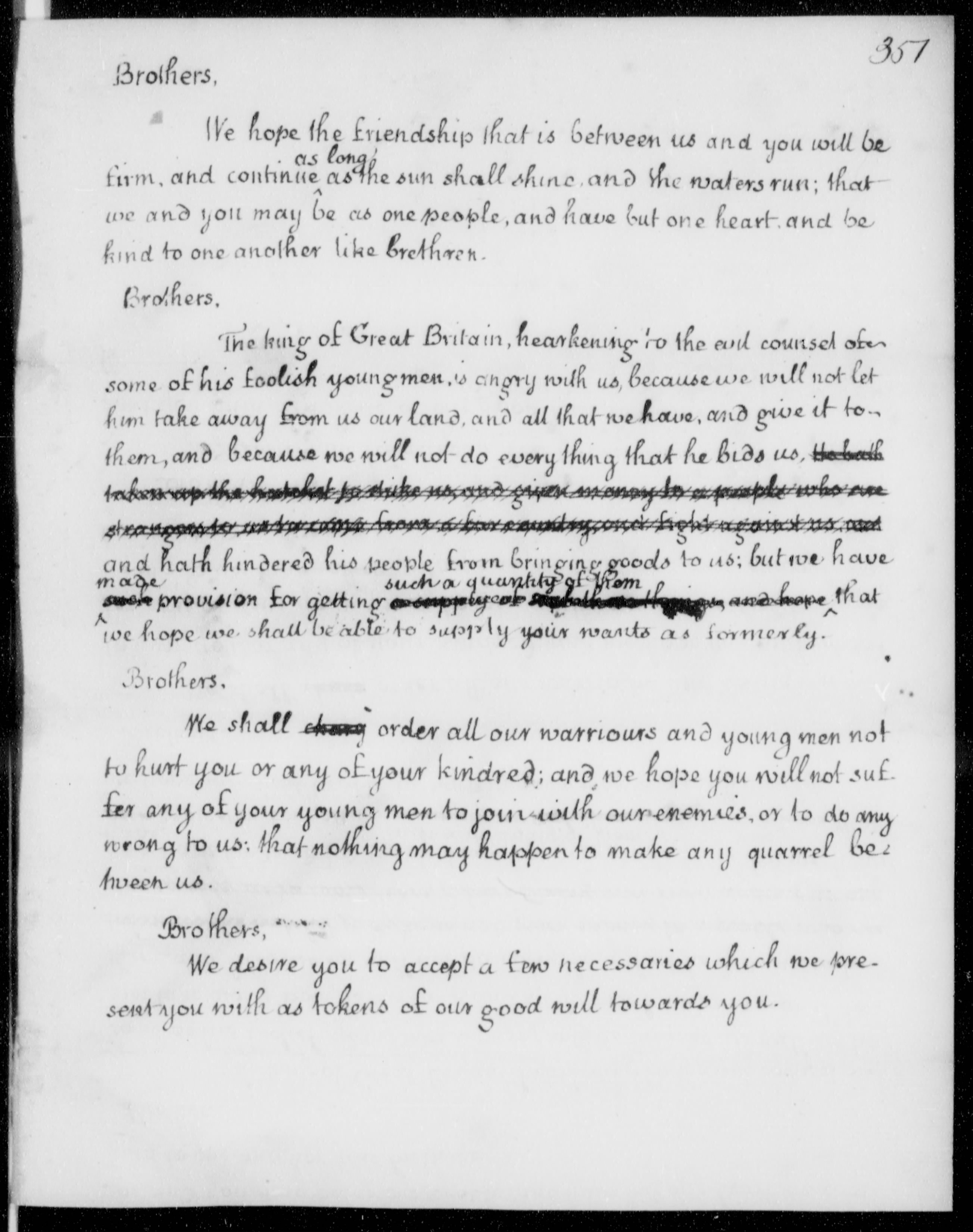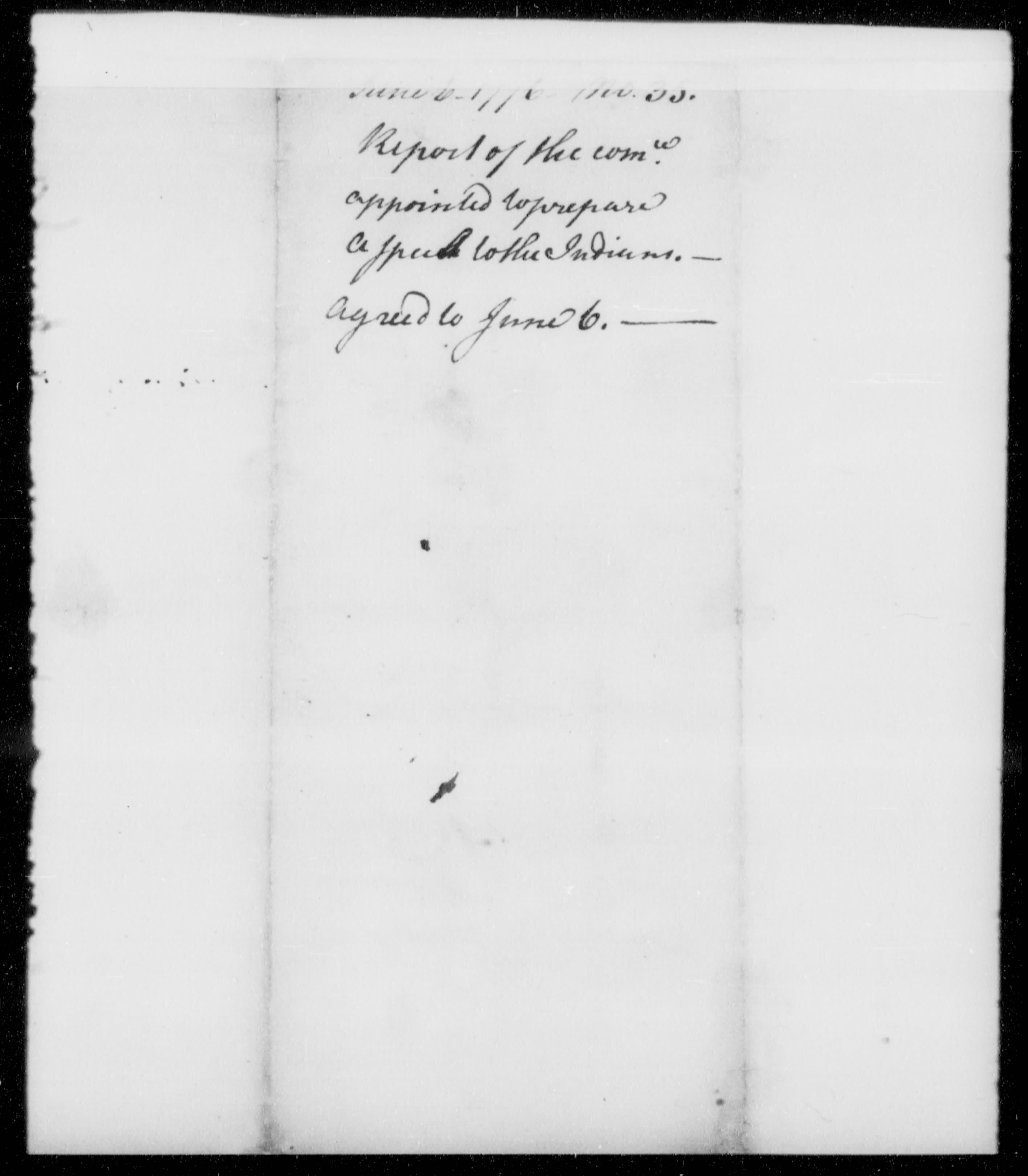Difference between revisions of "Address to the Indians"
| Line 1: | Line 1: | ||
[[File:AddressToTheIndians6June1776p1.jpg|thumb|right|350px|"Address to the Indians," in the handwriting of [[George Wythe]], dated June 6, 1776. In the ''Papers of the Continental Congress,'' No. 30, folio 351. Image from [http://www.fold3.com/image/447198/ fold3.] ]] | [[File:AddressToTheIndians6June1776p1.jpg|thumb|right|350px|"Address to the Indians," in the handwriting of [[George Wythe]], dated June 6, 1776. In the ''Papers of the Continental Congress,'' No. 30, folio 351. Image from [http://www.fold3.com/image/447198/ fold3.] ]] | ||
[[File:AddressToTheIndians6June1776p2.jpg|thumb|right|350px|Reverse of "Address to the Indians," endorsed "Report of the committee appointed to prepare a speech to the Indians. Agreed to June 6." In the ''Papers of the Continental Congress,'' No. 30, folio 352. Image from [http://www.fold3.com/image/447201/ fold3.] ]] | [[File:AddressToTheIndians6June1776p2.jpg|thumb|right|350px|Reverse of "Address to the Indians," endorsed "Report of the committee appointed to prepare a speech to the Indians. Agreed to June 6." In the ''Papers of the Continental Congress,'' No. 30, folio 352. Image from [http://www.fold3.com/image/447201/ fold3.] ]] | ||
| − | + | In the early days of the Revolutionary War, the [[wikipedia:Second Continental Congress|Continental Congress]] thought it "highly expedient to engage the Indians in the service of the United Colonies" against Great Britain and her allies.<ref>Worthington C. Ford, ed., [http://books.google.com/books?id=ljQSAAAAYAAJ&pg=PA396 ''Journals of the Continental Congress, 1774-1789''] vol. 4, ''January 1 - June 4, 1776'' (Washington, D.C.: Government Printing Office, 1906), 396.</ref> To that end, [[George Wythe]] was one of five members elected by Congress on April 30, 1776, to serve on a standing committee for Indian affairs: | |
<blockquote> | <blockquote> | ||
Agreeable to the order of yesterday, the Congress proceeded to the election of a committee for Indian affairs, and the ballots being taken and examined, | Agreeable to the order of yesterday, the Congress proceeded to the election of a committee for Indian affairs, and the ballots being taken and examined, | ||
| − | Mr. [George] Wythe, Mr. [James] Wilson, Mr. [Oliver] Wolcott, Mr. L[ewis] Morris, and Mr. [Edward] Rutledge, were chosen.<ref> | + | Mr. [George] Wythe, Mr. [James] Wilson, Mr. [Oliver] Wolcott, Mr. L[ewis] Morris, and Mr. [Edward] Rutledge, were chosen.<ref>Ford, [http://books.google.com/books?id=ljQSAAAAYAAJ&pg=PA319 ''Journals,''] 4:319.</ref> |
</blockquote> | </blockquote> | ||
Revision as of 09:50, 27 April 2014


In the early days of the Revolutionary War, the Continental Congress thought it "highly expedient to engage the Indians in the service of the United Colonies" against Great Britain and her allies.[1] To that end, George Wythe was one of five members elected by Congress on April 30, 1776, to serve on a standing committee for Indian affairs:
Agreeable to the order of yesterday, the Congress proceeded to the election of a committee for Indian affairs, and the ballots being taken and examined,
Mr. [George] Wythe, Mr. [James] Wilson, Mr. [Oliver] Wolcott, Mr. L[ewis] Morris, and Mr. [Edward] Rutledge, were chosen.[2]
A delegation of Iroquois deputies[3] arrived in Philadelphia on Saturday, May 25, 1776 (possibly with Oneida Chief Oskanondonha),[4] and Congress voted to grant them an audience the following Monday, at eleven o'clock. Finding the deputies "agreeable to order," the delegation was admitted,[5] and afterward, Congress resolved:
That the standing committee for Indian affairs, be directed to prepare a speech, to the Indians, and to procure such articles as they judge proper for presents to the Indians.[6]
The speech was duly prepared by the committee, and approved by Congress on June 6, 1776. Presentation of the speech was delayed until June 11, by which time such "proper" articles had been acquired for presentation to the Native American representatives.[7]
The manuscript of the approved speech is preserved in the Papers of the Continental Congress. The document is in George Wythe's writing, with his corrections and emendations. It was not recorded who delivered the speech.
Contents
Journals of the Continental Congress, vol. 5
Page 430
The present[s] being provided for the Indians, they were called in, and the speech agreed to, was delivered as follows:
BROTHERS,
We hope the friendship that is between us and you will be firm, and continue as long as the sun shall shine, and the waters run; that we and you may be as one people, and have but one heart, and be kind to one another like brethren.BROTHERS,
The king of Great Britain, hearkening to the evil counsel of some of his foolish young men, is angry with us, because we will not let him take away from us our land, and all that we have, and give it to them, and because we will not do every thing that he bids us;1 and hath hindered his people from bringing goods to us; but, we have made provision for getting such a quantity of them, that we hope we shall be able to supply your wants as formerly.BROTHERS,
We shall order all our warriors and young men not to hurt you or any of your kindred, and we hope you will not suffer any of your young men to join with our enemies, or to do any wrong to us, that nothing may happen to make any quarrel between us.BROTHERS,
We desire you to accept a few necessaries, which we present you with, as tokens of our good will towards you.2The presents being delivered, the Indians begged leave to give a name to the president; the same being granted, the Onondago chief gave the president[8] the name of Karanduawn, or the Great Tree, by which name he informed him the president will be known among the Six nations.
1In the original report this sentence follows: "he hath taken up the hatchet to strike us, and given money to a people who are strangers to us, to come from a far country, and fight against us."[9]
2This report, in the writing of George Wythe, is in the Papers of the Continental Congress, No. 30, folio 351. It was presented and agreed to on June 6.
Page 431
ǁAfter which the Indians took their leave and withdrew.ǁ[10]
See also
References
- ↑ Worthington C. Ford, ed., Journals of the Continental Congress, 1774-1789 vol. 4, January 1 - June 4, 1776 (Washington, D.C.: Government Printing Office, 1906), 396.
- ↑ Ford, Journals, 4:319.
- ↑ The Native American delegation is described as being from four of the "Six Nations": a confederation of Iroquois-speaking tribes made up of the Mohawk, Oneida, Onondaga, Cayuga, Seneca, and Tuscarora nations.
- ↑ Paula Underwood, Franklin Listens When I Speak: Tellings of the Friendship between Benjamin Franklin and Skenandoah, an Oneida Chief (San Anselmo, CA: A Tribe of Two Press, 1997), 44.
- ↑ Ford, Journals, 4:392, 396.
- ↑ Ibid., 397.
- ↑ Worthington C. Ford, ed., Journals of the Continental Congress, 1774-1789 vol. 5, June 5 - October 8, 1776 (Washington, D.C.: Government Printing Office, 1906), 421.
- ↑ John Hancock.
- ↑ A reference to foreign, particularly Hessian, mercenaries.
- ↑ Ford, Journals, 5:430-431.